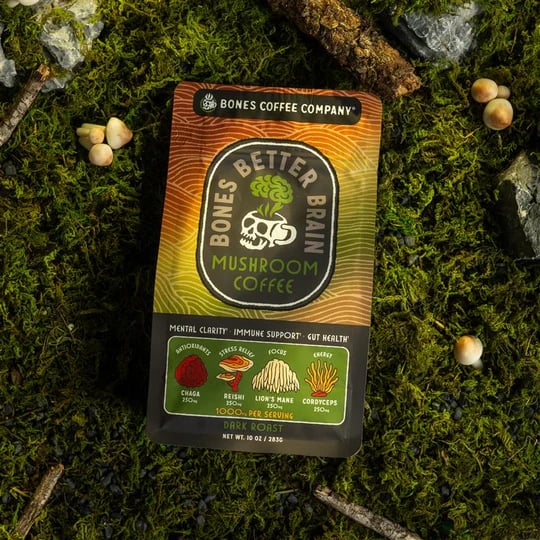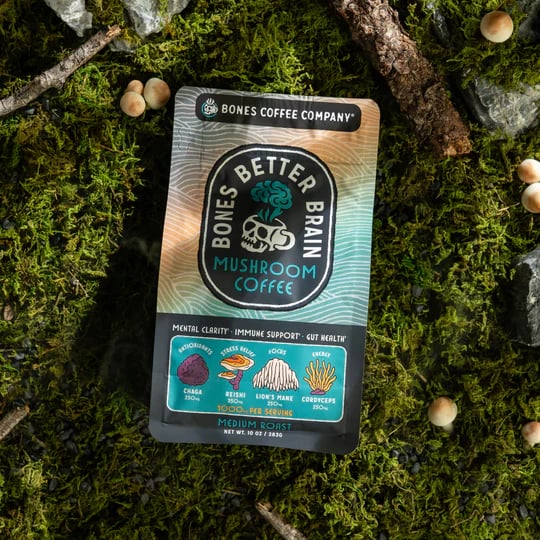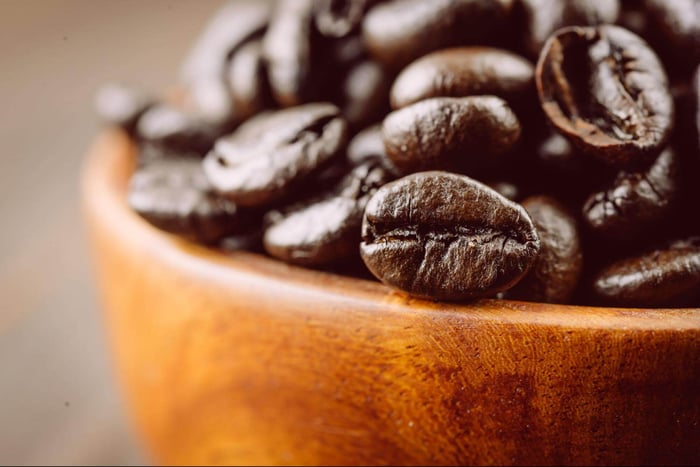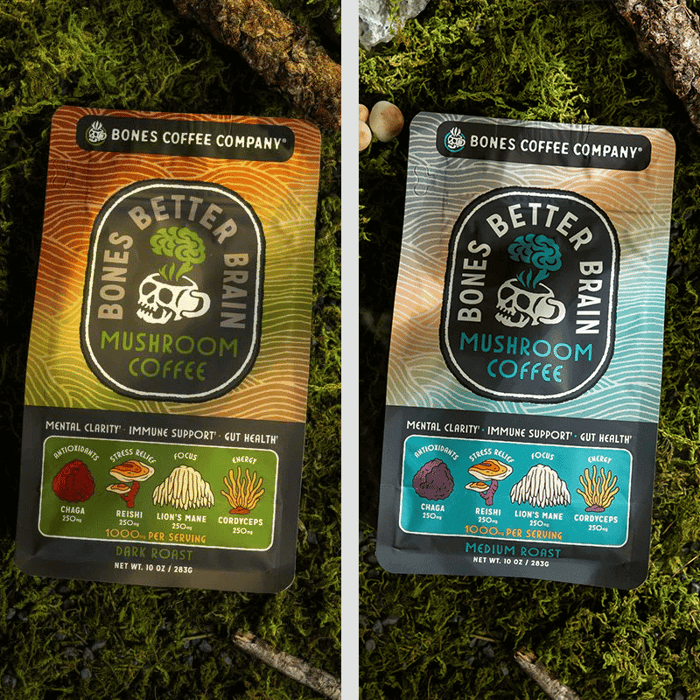Mushroom coffee is the latest wellness trend brewing in mugs worldwide. It promises the energy of coffee without the jitters, plus a host of other health benefits. But when it comes to one of our most vital organs, the liver, is mushroom coffee good for it or just a hyped-up foe?
We're diving deep into the science to separate the facts from the funk and see how this unique brew impacts your liver health.
Quick Take: The Short Answer
For most healthy people, mushroom coffee is likely safe for the liver and may offer some supportive benefits, but the human-based evidence is still in its early stages.
Think of it as a potential upgrade to your daily ritual rather than a magic cure. It combines the well-studied liver-protective effects of regular coffee with the emerging antioxidant properties of medicinal mushroom species.
- Potential Perks: A synergistic antioxidant boost from coffee's chlorogenic acids and mushrooms' polyphenols, potentially reducing oxidative stress on the liver, helping combat chronic diseases.
- Cautions to Consider: The science is mostly from animal or lab studies, and quality varies wildly. People with existing hepatic disease, digestive or kidney issues, on certain medications, or with mushroom allergies should be cautious.
- Who Might Try It: Healthy adults looking to reduce caffeine intake slightly while exploring new functional foods and unique flavors.
Important: This information is for educational purposes only and is not medical advice. If you have liver disease, take medications, or have health concerns, consult your healthcare provider before adding mushroom coffee to your routine.
What Exactly Is Mushroom Coffee?
Mushroom coffee isn't about dropping portobellos or whole mushrooms into your French press. It's ground coffee beans and powdered extracts from functional mushrooms. The typical ratio is heavily skewed towards coffee, meaning you get the traditional cup of coffee with an added functional boost.
The goal is to deliver the mushroom's medicinal properties without overpowering the taste of your beloved brew. Flavor-wise, it's surprisingly smooth. The extracts add a subtle, earthy depth that many find less acidic than a traditional cup of coffee, and it generally packs less of a punch, with most servings containing about half the caffeine of a standard cup.
Here are the common extracts and their signature actives:
- Reishi: Known for ganoderic acids, compounds studied for their calming and immune-supporting properties on human health.
- Chaga: A powerhouse of polyphenols and melanin, potent antioxidants that combat cellular damage.
- Lion’s Mane: Famous for hericenones and erinacines, which are linked to cognitive support and brain health.
- Cordyceps: Contains cordycepin, a unique compound investigated for energy and athletic performance enhancement.
- Turkey Tail: Rich in Polysaccharide-K (PSK) and Polysaccharide Peptide (PSP), known for their immunomodulatory effects.
Regular Coffee & Liver Health: What We Already Know
Before we dive into the fungi, let's honor the hero already in your cup: the coffee bean. The connection between regular coffee consumption and liver health is one of the most robust in nutritional science.
A meta-analysis found that an increase of 2 cups of coffee per day was associated with a 43% reduced risk of liver cancer, the most serious chronic disease affecting the liver.
Furthermore, consumption of more than 2 cups per day in patients with preexisting hepatic disease is associated with a lower incidence of fibrosis and cirrhosis. This isn't a coincidence; ground coffee beans are packed with bioactive compounds that actively protect the liver, reduce inflammation, and slow the progression of scarring (fibrosis).
Key coffee compounds and their liver actions:
- Chlorogenic acids: Potent antioxidant properties that reduce oxidative stress and inflammation.
- Cafestol & Kahweol: Modulate cellular signals to exert anti-fibrotic effects.
- Trigonelline: Improves insulin sensitivity, reducing fat accumulation in the liver. A study indicated that coffee consumption was associated with improved serum gamma-glutamyltransferase, aspartate aminotransferase, and alanine aminotransferase values in individuals at risk for liver disease.
Key Insight: The science is clear: regular coffee is a well-established liver protector. Mushroom coffee aims to enhance these known health claims, creating a potential synergistic brew for daily wellness. |
Meet the Medicinal Mushrooms: Evidence for Hepatoprotection
Now for the supporting cast. While human data is still growing, animal and in-vitro studies suggest several popular mushrooms have direct liver-protective (hepatoprotective) properties. Here’s a look at the science behind the most common extracts found in mushroom coffee.
Reishi (Ganoderma lucidum)
Often called the "mushroom of immortality," Reishi has a long history in traditional medicine. Its primary liver-protective power comes from triterpenoids called ganoderic acids. Animal studies show that the Reishi mushroom significantly lowered elevated liver enzymes in rats with liver injury.
 |  |
|
|
Chaga (Inonotus obliquus)
Chaga is an antioxidant superstar, containing high concentrations of melanin and polyphenols. These compounds are exceptional at neutralizing free radicals that cause oxidative stress, a key driver of liver damage and disease.
Cordyceps (C. militaris / C. sinensis)
Known for boosting energy, Cordyceps also appears to help the liver. Its active compound, cordycepin, has been shown in animal models to protect the liver from various forms of liver toxicity. This mushroom species works by boosting the body's own antioxidant enzymes.
Lion’s Mane (Hericium erinaceus)
While celebrated for its brain-boosting benefits, Lion's Mane shows promise for metabolic health, which is closely tied to the liver. Research is focused on non-alcoholic fatty liver disease (NAFLD), with animal studies showing positive effects. However, there are currently no direct human trials investigating its effects on disease markers.
Turkey Tail (Trametes versicolor)
Turkey Tail is researched for its immune-modulating effects. Its benefit to the liver is likely more indirect; chronic systemic inflammation is a major contributor to liver stress. By supporting a balanced immune response, Turkey Tail may help lessen the inflammatory burden on the liver.
Key Insight: While lab and animal studies are exciting, human scientific evidence for whole mushrooms' direct liver benefits is still emerging. The potential is high, but the science is in its early chapters. |
Table: Regular Coffee vs. Mushroom Coffee vs. Individual Mushroom Extracts
Beverage / Extract | Key Actives | Net Effect on Liver Markers |
|---|---|---|
Coffee | Chlorogenic acids | ↓ GGT, fibrosis risk |
Mushroom Coffee | Mix (coffee + fungi) | Synergy theory |
Reishi Extract | Ganoderma Lucidum | ↓ ALT ((alanine transaminase) /AST (aspartate transaminase) |
Chaga Extract | Polyphenols | ↓ Collagen deposition |
Cordyceps Extract | Cordycepin | ↑ Glutathione |
Lion's Mane Extract | Hericenones | Alleviates non-alcoholic fatty liver disease (NAFLD) |
Turkey Tail Extract | Polysaccharide Krestin(PSK), polysaccharide peptide (PSP) | Indirect (inflammation) |
Potential Benefits of Mushroom Coffee for Liver Health
When you combine coffee and medicinal mushrooms, you're creating potential synergies. Here are some of the benefits of mushroom coffee for your liver:
- Synergistic Antioxidant Capacity: Coffee brings the chlorogenic acids, and mushroom coffee offers polyphenols and beta-glucans. Together, they offer a broader spectrum of antioxidant compounds to help protect the liver.
- Less Caffeine Content: Standard coffee contains around 95 mg of caffeine per cup, while mushroom coffee typically has approximately 50 mg. The lower caffeine content can reduce jittery side effects for some, while still providing benefits.
- The Adaptogenic Halo Effect: Many functional mushrooms, like Reishi, are adaptogens, meaning they may help the body manage stress. Chronic stress can contribute to inflammation in the liver, so moderating the stress response may offer indirect support.
Risks, Side-Effects & Common Myths
While generally safe for most, it's crucial to approach mushroom coffee with a clear understanding of its limitations and potential risks. Let's separate the facts from the marketing hype.
Myths Busted
- It’s caffeine-free: Nope. It contains less caffeine than regular coffee, but it is definitely not caffeine-free. Always check the label if you are sensitive.
- It cures liver failure: Hard pass. No food or dietary supplement can cure serious conditions like cirrhosis or acute liver failure. Mushroom coffee is a supportive beverage, not a medical treatment.
- Any mushroom powder equals quality: Spoiler: this is false. The source and extraction process matter immensely. Extracts from the "fruiting body" of the mushroom contain the highest concentration of active compounds.
Side-Effects & Contra-Indications
- Allergies: If you have a known allergy to mushrooms or mold, steer clear.
- Gastrointestinal Upset: High doses can cause digestive issues like bloating for some individuals.
- Drug Interactions: Certain mushroom compounds can have blood-thinning or immunomodulatory effects. Consult a healthcare provider if you take warfarin or immunosuppressants.
- Special Conditions: Due to a lack of research, it’s best to avoid mushroom coffee if you are pregnant, breastfeeding, have digestive or kidney issues or have a scheduled surgery.
Warning/Important: Consulting your healthcare provider before trying mushroom coffee is a critical safety step if you have a pre-existing liver condition or take medications like immunosuppressants or blood thinners. |
Buying & Brewing Smart: Liver-Loving Checklist
Ready to explore the world of mushroom coffee products? Don't just grab the first bag you see. Follow these Brew Commandments to ensure you're sipping on quality.
- Thou shalt choose the dual extraction process, fruiting-body-only powders. This ensures you get the full spectrum of beneficial compounds.
- Thou shalt demand transparency. Look for brands that proudly display their beta-glucan percentage (a key quality marker).
- Thou shalt savor creative flavors. Life's too short for boring coffee! A functional brew can still be a flavor bomb.
- Thou shalt sample before thou commit. Not sure if you'll like the earthy notes? The best way to find out is to try a few with a custom sample pack.
For optimal brewing, use water just off the boil (around 195°F / 90°C) to avoid scorching the delicate compounds. Let it steep for a few minutes and give it a light stir to ensure the extracts fully dissolve.
Who Should and Shouldn’t Try Mushroom Coffee?

Mushroom coffee can be a fantastic addition for some, but it’s not for everyone. Here’s a quick guide to help you decide if it's the right brew for you.
- Great fit for: Healthy adults curious about mushroom coffee products, those looking to reduce caffeine intake, and flavor explorers eager to try something new.
- Caution/avoid: If you have a diagnosed hepatic disease (like cirrhosis or hepatitis) and are on medication, do not add mushroom coffee without consulting your doctor first. The same applies to those with autoimmune disorders, organ transplant recipients, or anyone on blood-thinning drugs.
Pro Tip: Treat mushroom coffee as a supportive upgrade, not a cure. For true liver health, prioritize the fundamentals: a balanced diet and regular exercise. This brew is a bonus, not the backbone. |
FAQ Corner
1. Is mushroom coffee decaf?
No, it is not decaf coffee, but it is "less-caf." Most mushroom coffee contain less caffeine, typically around 40-60 mg per serving. This makes it a great option for people who are sensitive to high doses of caffeine but still want a little morning lift.
2. Does it taste earthy or sweet?
It's a bit of both! The mushrooms add a subtle, earthy depth that reduces the natural acidity of coffee. Mushroom coffee offers a smooth and complex, pairing beautifully with the natural sweet and roasted notes of the coffee beans.
3. How long until I notice health benefits?
The potential long-term benefits of mushroom coffee are subtle and cumulative. You might notice the lower caffeine effect right away, but other health benefits build up over weeks and months of consistent use as part of a healthy lifestyle.
4. Can I just add mushroom powder to my existing Bones roast?
You certainly can! Just make sure you are buying a high-quality, dual-extracted mushroom powder designed for dissolving in liquid. This gives you total control over the dosage and allows you to pair your favorite functional mushroom with any Bones Coffee flavor.
5. Will drinking mushroom coffee break my intermittent fast?
If you drink it black, mushroom coffee is unlikely to break your fast. The extracts themselves contain a negligible number of calories. However, adding any milk, cream, or sugar will definitely break your fast.
Support Your Liver With Every Sip
So, is drinking mushroom coffee good for your liver? The scientific evidence is promising yet preliminary. It should be seen as a "supporting actor" that complements the proven health benefits of regular coffee, not a "lead cure" for liver ailments.
For healthy individuals, a safe starting dose is one cup per day. For true liver health, stack it with the non-negotiables: a balanced diet, regular exercise, and maintaining a healthy weight. Always consult your doctor for personalized advice.
Our final verdict? Chat with your healthcare pro to make sure it's a good fit for you, then treat your taste buds to a Bones Coffee premium mushroom coffee to discover your perfect liver-loving brew.
Experience the perfect balance of bold flavor, functional benefits, and liver-loving ingredients, one delicious cup at a time. Shop now and enjoy free US shipping on orders over $75 after any applied discounts. Discover your new morning ritual, one delicious cup at a time!






